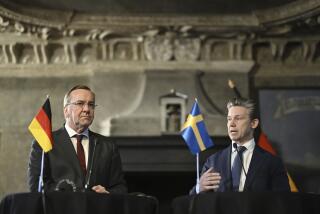From the archives: Solidarity Editor Will Be Premier
WARSAW -- In a dramatic reversal of 45 years of Communist rule in Poland, President Wojciech Jaruzelski is expected today to offer the post of prime minister to newspaper editor Tadeusz Mazowiecki, a longtime opposition activist and a key Solidarity adviser.
Mazowiecki, 62, known as a soft-spoken conciliator among his Solidarity colleagues, met for two hours with Jaruzelski on Friday and afterward told reporters that he expected a formal offer of the post from the president.
“I am ready to accept it,” he said.
There was no certainty about when the announcement might come, but a presidential television message is scheduled for 6 p.m. today, following a meeting of the Communist Party’s Central Committee. Political observers assume that Jaruzelski will discuss his move with the party’s leadership before making it public.
“We had long talks with the president, which were very fundamental, concerning all important issues,” Mazowiecki said. “I think there will be solutions very soon.”
Mazowiecki (pronounced mah-zoe-vee-ET-skee) spoke in his customarily calm manner with a crowd of journalists trailing him through the parliament building as he arrived for a meeting with Solidarity’s leadership. He was asked when he expected to name a government.
“I wish I knew that myself,” said the editor of the Weekly Solidarity newspaper. “There is great social impatience, but this is to be a government formed on a completely new principle, and I need some time.”
The new principle is the nearest approach to a parliamentary democracy in Eastern Europe since the region was politically colonized by Soviet dictator Josef Stalin at the end of World War II.
The acceptance by Jaruzelski of Solidarity leader Lech Walesa’s plan for a government led by Solidarity appears to spell the end of another principle dearly held by Communists: the leading role of the Communist Party in the affairs of the state.
“This is definitely the final nail in the coffin of the leading role of the Communist Party,” said Janusz Onyskiewicz, the Solidarity spokesman. “This is the end of the whole concept.”
In Kennebunkport, Me., where President Bush is spending a summer vacation, White House Press Secretary Marlin Fitzwater held out the possibility that greater U.S. assistance for Poland might follow a change in the government there.
No Added U.S. Aid Now
But for the time being, he said, “it is really premature” to think about increasing U.S. aid to Poland beyond the approximately $100 million that Bush pledged during a visit there last month.
“We don’t have a lot of money to offer,” Fitzwater said, referring to the federal budget deficit. But, he said, “It is something we would have to consider down the road.”
Beyond expressing encouragement for a shift to a non-Communist government, as officials have done in the past, the White House spokesman declined to comment on the prospects for change in Warsaw, saying formal White House reaction would await an official announcement there.
Among the parade of Communist officials calling on Jaruzelski on Friday was Mieczyslaw F. Rakowski, the new Communist Party chief, who has lately been exhorting rank-and-file Communists to respond boldly to what he calls “a struggle for power” in Poland.
However, it seemed unlikely that Rakowski or other party hard-liners would be able to derail the Mazowiecki nomination. Under Polish law, Jaruzelski, who recently stepped aside as Communist Party leader to assume his duties as president, must submit his nomination for prime minister to the Sejm, or lower house of Parliament, for approval.
With Solidarity’s forces in the Parliament augmented by two new coalition partners, the United Peasants’ Party and the Democratic Party, the election of a Solidarity candidate is virtually assured. The Solidarity alliance now controls the Sejm by 264 to 196.
It was Walesa and his envoy Jaroslaw Kaszynski, a Solidarity deputy in the Sejm, who negotiated the coalition with the United Peasants and the Democrats, persuading the two minor parties--with 103 votes between them--to abandon a 40-year-old partnership with the Communists and come over to the Solidarity side.
The switch by the two parties was the keystone in Walesa’s shrewdly calculated drive to back the Communists into a corner with his campaign for a Solidarity-led government--a move he decided on himself, even though his key advisers had been saying for months that Solidarity was not ready to form a government.
Amid mounting speculation over whether there should be a Solidarity government--and whether Walesa himself, with his enormous prestige in the country, would head it--the designated prime minister, Czeslaw Kiszczak, was unable to recruit a Cabinet. He announced Monday that he was ready to give up the attempt, which was the point at which Walesa’s forces came together.
Walesa’s comments throughout the last 10 days suggested that he would be willing to serve as prime minister, but Solidarity members say it is now clear that he had no intention of taking the post. But by keeping open the possibility, he ensured that the drive for the coalition would be accepted both by Solidarity’s Sejm deputies and by the United Peasants and Democrats.
Walesa met Thursday with Jaruzelski, who accepted Walesa’s plan along with his choice for prime minister.
Solidarity officials said after the meeting that two other names beside Mazowiecki’s were mentioned: Jacek Kuron, a blunt-spoken and sometimes controversial opposition activist, and Bronislaw Geremek, a cerebral professor of medieval history who heads Solidarity’s Sejm delegation. But Mazowiecki, insiders say, was the choice Walesa conveyed to Jaruzelski.
Skilled Mediator
Among Mazowiecki’s qualifications for the job, colleagues say, are his skills as a mediator and a thoughtful tactician. However, some colleagues say that Mazowiecki was more suitable to Walesa than Geremek, whose bolder style and ambitions could one day conflict with the Nobel Peace Prize winner’s.
Mazowiecki has been a close adviser to Walesa for years, and his credentials as an opposition activist are impeccable. Unlike both Kuron and Geremek, who were once members of the Communist Party, Mazowiecki, closely associated with the Roman Catholic Church, has never been a member of the party.
He joined Solidarity at the outset, circulating a petition among intellectuals in support of the shipyard strikers in Gdansk in August, 1980. After the martial-law crackdown in 1981, he was jailed for a year. But he was back in the shipyard, at Walesa’s side, in the strikes of April, 1988, the first walkouts by the union since its banning in 1982.
“There are huge troubles,” Mazowiecki said Friday. “But I believe we can overcome them. If I didn’t believe, I would never have taken this up. I am a believer, and I believe that Providence takes care of us.”
He said he had hope that “people will feel things can be better.”
History, he said, “has shown in several moments that Poles can strive for new solutions, unusual and innovative ones. I hope that such a psychological moment is arriving now, that people will feel that there is a situation in which our future depends on us.”
Times staff writer James Gerstenzang, in Kennebunkport, contributed to this story.
More to Read
Start your day right
Sign up for Essential California for news, features and recommendations from the L.A. Times and beyond in your inbox six days a week.
You may occasionally receive promotional content from the Los Angeles Times.






